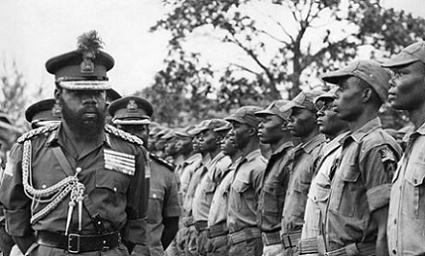50 YEARS AGO —Nigeria’s head of state Col. Yakubu Gowon has declared total war on Biafra. He has promised that the war with the “rebels” would not last beyond 48 hours.
July 6, 1967, the day the war officially began, was a cursed day!
Gowon lied that the war would end in two days. The 32-year-old, who emerged head of state almost a year earlier after the betrayal and assassination of former head of state Gen. Johnson Umunnakwe Aguiyi-Ironsi, had sent “policemen” to march to Eastern Nigeria and arrest Biafran leader Col. Chukwuemeka Odumegwu Ojukwu. They couldn’t. Instead, they were arrested and tortured in Biafra.
For 18 months the clouds had been gathering. The first military coup led by Major Chukwuma Kaduna Nzeogwu and Major Emmanuel Ifeajuna, which happened on January 15, 1966, was the first spark. Political leaders were killed: the victims included Prime Minister Abubakar Tafawa Balewa, Premier Ahmadu Bello, Premier SL Akintola, Finance Minister Festus Okotie-Eboh, and some senior military officers. But the killings were considered lopsided, because the coup did not succeed in the Eastern Region.
General Aguiyi-Ironsi, as supreme commander, quelled the coup and then formed a military government. He introduced Decree 34 of 1966 to make the country a unitary state. He was betrayed and assassinated on July 29.
The military governor of the Eastern Region, Col. Ojukwu, condemned Ironsi’s killing and takeover of the government by Lt. Col. Gowon. At least five other officers, including Ojukwu and Brigadier Ogundipe, were senior to Gowon.
Then the pogrom started — innocent civilians and soldiers from the Eastern Region were massacred in various parts of the north. Peace meetings failed. The one organised in Aburi, Ghana, in January 1967, came closest to success as it was agreed that Nigeria should be a confederation of states. But the federal side led by Gowon violated the agreement and denied all the resolutions reached at Aburi, ostensibly on the advice of the British who warned Gowon that Nigeria would not survive without the oil in the Eastern Region.
As the killing of Easterners continued without any conscious effort by Gowon to stop it, Ojukwu was mandated to declare the Federal Republic of Biafra on May 30, 1967.
For 30 months, the war raged. By the time Ojukwu’s deputy Gen. Philip Effiong surrendered on January 12, 1970, after Ojukwu travelled to Ivory Coast, 2 – 5 million people had died, most of them civilian victims of war criminals: troops mainly from the federal side went into Biafran villages killing men, women and children. They destroyed homes and other assets as well as raped girls and women. Children starved to death.
Forty-seven years after the war with Biafra, Nigeria has become even more divided. Agitations for the restoration of Biafra are widespread, with militant groups emerging daily from the creeks of the Niger Delta and the south-east (the former Biafran territory).
Nnamdi Kanu, leader of the Indigenous People of Biafra, IPOB, was in jail until May 2017. Now, IPOB and MASSOB demand a referendum, after a northern group had given Igbo people living in the north up until October 1 to leave the north.
(Updated: July 6, 2017)
#











